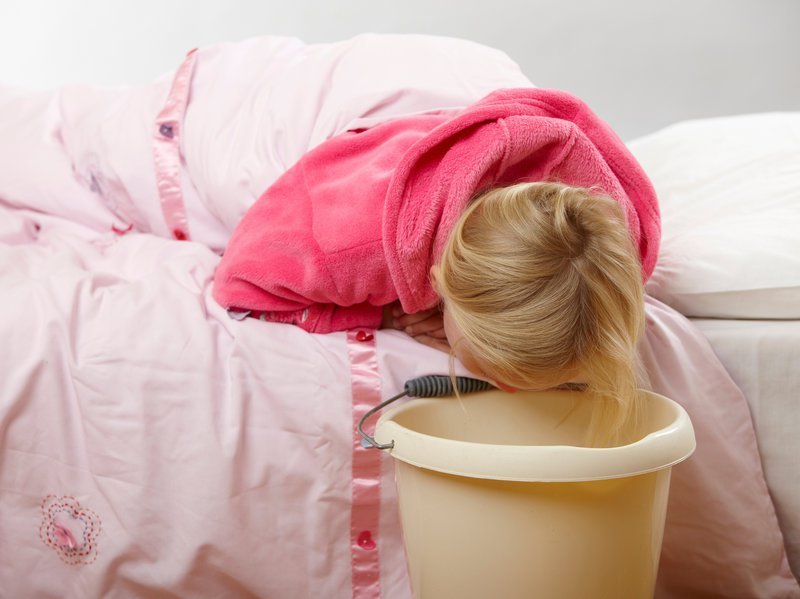Vomiting fluid in children: How to handle when your child vomits continuously?
12/05/2022 10:06 GMT+7
The Covid-19 epidemic has just decreased, many mothers like to sit on the fire when their children are constantly vomiting, stomachaches can’t find the cause.
Taking her child to the Pediatric Department, Bach Mai Hospital for examination, Ms. Le Hang – Hoang Mai, Hanoi said that her 4-year-old daughter vomited from the previous day. Baby vomits a little at first. Hang thought it was due to the food and the baby running around, so she choked on the candy. However, at noon, the child was still vomiting, the kindergarten teacher had to call Hang to pick up the child.
When he got home, he vomited a lot. Every time I vomit, I ask for water and I drink it again and I vomit with stomach pain. Hang gave her child anti-vomiting medicine prescribed by the doctor when she had Covid-19 more than two months ago. However, the next day, the baby was tired and lost his appetite, so she took him to the doctor. The doctor said that the baby vomited a lot and had electrolyte disturbances, so she advised her to send her to the hospital for intravenous fluids. In the hospital room, there were many children like her who also vomited yellow bile.
Doctor Nguyen Manh Cuong – Pediatrics, 103 Military Hospital, said that recently every day, the department also received many children with vomiting and even vomiting because of dehydration. Some children vomit with diarrhea.
Doctor Cuong recommends parents to recognize that their child is vomiting with acute diarrhea such as having loose or watery stools or having blood in the stools > 2 times in 24 hours, the number of days with diarrhea is < 14 days.Digestive symptoms: Vomiting a lot, may not be able to drink water, eating poorly. Passing frequent loose or watery stools.
 |
| Children vomiting should take anti-vomiting medicine. |
Signs of dehydration such as the child is thirsty, eager to drink (wins a glass of water, waits for a drink) or worse, cannot drink, drinks poorly, eyes sunken, may cry without tears. If the child is severely dehydrated, he may be irritable at first and then lethargic. Newborns have dimples.
When the child is vomiting, parents need to monitor the child and perform the correct home treatment such as low osmolality oresol supplementation (similar in nature to normal Oresol but lower concentration of substances): A study was conducted in In 5 developed countries, the subjects were infants from 1 month to 2 years old with diarrhea and dehydration.
Research has shown that the use of low sodium and glucose Oresol reduces the need for intravenous fluids by 33%. The “modified” Oresol has the same safety and efficacy as standard Oresol in the prevention and treatment of dehydration in all types of diarrhea, on the other hand, it also reduces stool volume (20 reductions by 20). %) and has many other important clinical benefits. Vomiting rate also decreased by 30%.
Parents supplement zinc for their children: Helps to quickly recover intestinal mucosal cells. Children under 6 months: supplement 10mg of elemental zinc/day for 10-14 days. Older children 20mg/day x 10-14 days
Use of antiemetics or antibiotics must be prescribed by a doctor. Probiotics (probiotics): help increase the resistance of the intestinal mucosal barrier, stop using it for the first 3 days.
Racecadotril: a product that helps reduce water in the stool, used for the first 3 days, prioritizing diarrhea with a lot of secretions, at a dose of 1.5 mg/kg/8 hours. Babies who are still suckling continue to suckle, but they need to suckle more, without abstaining.
When giving Oresol to children, the recommended dosage: Children under 24 months take 50-100ml of oresol after 1 episode of diarrhea, take up to 500ml. Children from 2 to 10 years old: drink 100-200ml after 1 bowel movement, up to 1000ml. Children older than 10 years old drink on demand but up to 2000 ml.
Symptoms that need to be taken to the hospital:
– If the baby vomits 4 times / 1 hour or 6 times in 4 hours
– Children can’t drink, if they drink, they will vomit
– The child has many bowel movements without holding, or the stools are bloody, with a fishy smell..
– Newborns can’t suckle when touching the fontanel
– Children cry without tears, eyes sunken, pinching the skin on the abdomen slows down, can’t drink, children call and ask no response.
According to Dr. Cuong, mistakes should be avoided: Taking antibiotics when the cause is unknown, drinking to reduce the elimination of agents and toxins, drinking to stop vomiting.
Give children a strict diet: make them malnourished, give them soft drinks: this makes bowel movements and dehydration faster because it pulls water into the intestines.
The best way to prevent this, Dr. Cuong said, is to wash your hands often, not to eat strange foods, not to share dishes and utensils, to limit sucking on toys, to eat cooked food, and to drink boiling water.
Khanh Chi
at Blogtuan.info – Source: infonet.vietnamnet.vn – Read the original article here


